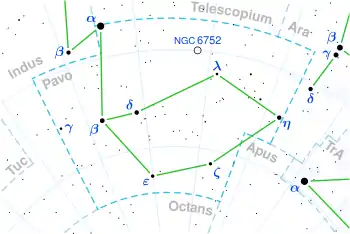HD 189567
HD 189567 is a G3V star located 58.5 light years away, in the constellation of Pavo. The star HD 189567 is also known as Gliese 776, CD-67 2385, and HR 7644.
 | |
| Observation data Epoch J2000.0 Equinox J2000.0 (ICRS) | |
|---|---|
| Constellation | Pavo[1] |
| Right ascension | 20h 05m 32.76549s[2] |
| Declination | −67° 19′ 15.2261″[2] |
| Apparent magnitude (V) | 6.07[3] |
| Characteristics | |
| Evolutionary stage | Main sequence |
| Spectral type | G3V[3] |
| Apparent magnitude (U) | 6.79[4] |
| Apparent magnitude (B) | 6.71[3] |
| Apparent magnitude (V) | 6.07[3] |
| Apparent magnitude (J) | 4.97[4] |
| Apparent magnitude (H) | 4.724±0.076[4] |
| Apparent magnitude (K) | 4.511±0.026[4] |
| Astrometry | |
| Radial velocity (Rv) | −10.548±0.0003[5] km/s |
| Proper motion (μ) | RA: 845.252±0.016 mas/yr[2] Dec.: −674.213±0.024 mas/yr[2] |
| Parallax (π) | 55.7654 ± 0.0245 mas[2] |
| Distance | 58.49 ± 0.03 ly (17.932 ± 0.008 pc) |
| Absolute magnitude (MV) | 4.75[3] |
| Details | |
| Mass | 0.83±0.01[3] M☉ |
| Radius | 1.1[2] R☉ |
| Luminosity | 2.11[3] L☉ |
| Surface gravity (log g) | 4.41±0.01[3] cgs |
| Temperature | 5726±15[3] K |
| Metallicity [Fe/H] | −0.24±0.01[3] dex |
| Rotational velocity (v sin i) | 2.0[6] km/s |
| Age | 11.0±0.5[3] Gyr |
| Other designations | |
| Database references | |
| SIMBAD | data |
The star is moderately depleted in heavy elements, having 55% of the solar abundance of iron,[7] but is less depleted in oxygen, having 80% of its solar abundance.[8]
Planetary system
One exoplanet was discovered around the star in 2011, HD 189567 b.[9] This exoplanet has an estimated minimum mass of 8.5 Earth masses, which means that it is most likely a mini-Neptune.[10] It has an orbital period of 14.3 days, placing it well interior to the habitable zone of the star system.[11] The planet's existence was confirmed in 2021, along with the discovery of a second planet, HD 189567 c.[3]
| Companion (in order from star) |
Mass | Semimajor axis (AU) |
Orbital period (days) |
Eccentricity | Inclination | Radius |
|---|---|---|---|---|---|---|
| b | ≥8.5±0.6 M🜨 | 0.111±0.002 | 14.288±0.002 | <0.189 | — | — |
| c | ≥7.0±0.9 M🜨 | 0.197±0.003 | 33.688±0.025 | 0.16±0.09 | — | — |
References
- Staff (2 August 2008). "Finding the constellation which contains given sky coordinates". DJM.cc. Retrieved 2 January 2021.
- Vallenari, A.; et al. (Gaia collaboration) (2023). "Gaia Data Release 3. Summary of the content and survey properties". Astronomy and Astrophysics. 674: A1. arXiv:2208.00211. Bibcode:2023A&A...674A...1G. doi:10.1051/0004-6361/202243940. S2CID 244398875. Gaia DR3 record for this source at VizieR.
- Unger, N.; Ségransan, D.; et al. (2021). "The HARPS search for southern extra-solar planets. XLVI. 12 super-Earths around the solar type stars HD 39194, HD 93385, HD 96700, HD 154088, and HD 189567". Astronomy & Astrophysics. 654: A104. arXiv:2108.10198. Bibcode:2021A&A...654A.104U. doi:10.1051/0004-6361/202141351.
- "HD 189567 -- High proper-motion Star". SIMBAD. Centre de Données astronomiques de Strasbourg. Retrieved 2 January 2021.
- Soubiran, C.; Jasniewicz, G.; Chemin, L.; Zurbach, C.; Brouillet, N.; Panuzzo, P.; Sartoretti, P.; Katz, D.; Le Campion, J. -F.; et al. (2018). "Gaia Data Release 2. The catalogue of radial velocity standard stars". Astronomy and Astrophysics. 616: A7. arXiv:1804.09370. Bibcode:2018A&A...616A...7S. doi:10.1051/0004-6361/201832795. S2CID 52952408.
- Llorente de Andrés, F.; Chavero, C.; de la Reza, R.; Roca-Fàbrega, S.; Cifuentes, C. (October 2021). "The evolution of lithium in FGK dwarf stars". Astronomy & Astrophysics. 654: A137. arXiv:2108.05852. Bibcode:2021A&A...654A.137L. doi:10.1051/0004-6361/202141339. eISSN 1432-0746. ISSN 0004-6361.
- Giribaldi, R. E.; Porto De Mello, G. F.; Lorenzo-Oliveira, D.; Amôres, E. B.; Ubaldo-Melo, M. L. (2019). "Faint solar analogues at the limit of no reddening". Astronomy & Astrophysics. 629: A33. arXiv:1907.00445. doi:10.1051/0004-6361/201935901. S2CID 195766778.
- Nissen, P. E.; Christensen-Dalsgaard, J.; Mosumgaard, J. R.; Silva Aguirre, V.; Spitoni, E.; Verma, K. (2020). "High-precision abundances of elements in solar-type stars". Astronomy & Astrophysics. 640: A81. arXiv:2006.06013. doi:10.1051/0004-6361/202038300. S2CID 219573423.
- Mayor, M.; et al. (12 September 2011). "The HARPS search for southern extra-solar planets XXXIV. Occurrence, mass distribution and orbital properties of super-Earths and Neptune-mass planets". arXiv:1109.2497 [astro-ph].
- "The Habitable Exoplanets Catalog - Planetary Habitability Laboratory @ UPR Arecibo". phl.upr.edu. Retrieved 2020-12-16.
- "The Extrasolar Planet Encyclopaedia — HD 189567 b". exoplanet.eu. Retrieved 2020-12-16.
This article is issued from Wikipedia. The text is licensed under Creative Commons - Attribution - Sharealike. Additional terms may apply for the media files.